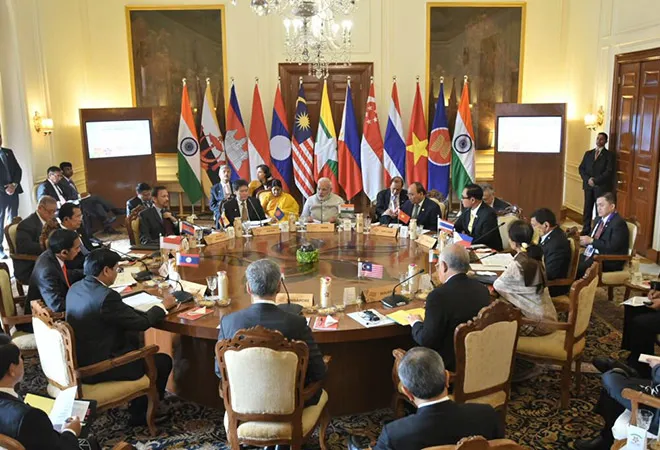-
CENTRES
Progammes & Centres
Location
India must step up its economic game with Association of Southeast Asian Nations, political payoffs will follow

Last week, India hosted ten ASEAN leaders as chief guests for the Republic Day. This was an innovative way of showing how important the regional grouping is to us. The chief guest at the Republic Day function has for long been a telegraphic means of conveying the importance Indian foreign policy attaches to a country at a particular juncture. Over the years, we have had the Saudis, Iranians, the French, last year we had the Crown Prince of Abu Dhabi, Many guests have come multiple times. There are some like from Pakistan and China we would not countenance today. The US our good friend was only invited for the first time in 2015.
The media has given its own spin to the event. Briefing the media, an MEA official did not respond directly to a question on weather ASEAN wanted India to play a role against China. Her non-committal response was that “India-ASEAN relationship stands on its own.” Yet the spin given to the report was that the ASEAN wanted India to play a more assertive role in the Indo-Pacific.
As of now ASEAN is India’s fourth largest trading partner; India is ASEAN’s seventh. It is also a major destination for outbound investments, with some 20 per cent going to ASEAN, mainly Singapore, with whom India has its deepest ties.
ASEAN has been China’s third largest trading partner for the past six years and China has been the ASEAN’s biggest trade partner for the past eight years in a row. More important, many Chinese companies are linked to ASEAN production centres through global value chains.
India, of course, has an important trade and investment agenda in the ASEAN region. But given its larger ambitions, it needs to draw in ASEAN into its connectivity plans. But it has not been able to do its bit, for example, in developing the Trilateral Highway, that would link India’s north-east with Myanmar, Thailand and onwards to Malayaia. But these plans include not just the developments of ports and roads, but also procedures and agreement for the smooth movement of goods and services. The Japan-India sponsored Asia Africa Growth Corridor will have a meaning only if the ASEAN acts as its eastern anchor.
ASEAN is also interested in connectivity and there are many areas that can be fruitfully explored, including the linkages of India’s east coast ports – Haldia, Paradip, Vizag and Chennai with ASEAN destinations.
Given the strategic nature of the Bay of Bengal, India has, since the 1990s, engaged ASEAN nations in maritime exercises bilaterally and multilaterally. As Modi pointed out in an article published in 27 different ASEAN newspapers, India has no disputes with any of its land or maritime neighbours—Myanmar, Thailand and Indonesia. This provides depth and transparency to ties between us and forms the basis of a deep relationship.
With China ignoring the verdict of the arbitration tribunal on the South China Sea, there is not much evidence of any effort to push back against China’s brazen tactics. The few weak freedom of navigation operations have done little to assuage ASEAN fears and the US withdrawal from the TPP undercut whatever hope there was of a coherent policy response to China in 2017.
Over the past decade, the ASEAN has been significantly weakened. Because it takes decisions only by consensus, certain pro-Chinese countries like Cambodia and Laos have weakened its voice, particularly when it comes to standing up to China.
Modi’s gesture has, no doubt, been seen as helpful by the ASEAN which has for long sought the role of India as a balancer against the pull of China. But New Delhi needs to be careful not to get sucked into a China-ASEAN quarrel. India cannot make up for the disarray within ASEAN in relation to China. What India needs to do is to step up its economic game with ASEAN, and perhaps political payoffs will follow.
This commentary originally appeared in Greater Kashmir.
The views expressed above belong to the author(s). ORF research and analyses now available on Telegram! Click here to access our curated content — blogs, longforms and interviews.

Manoj Joshi is a Distinguished Fellow at the ORF. He has been a journalist specialising on national and international politics and is a commentator and ...
Read More +